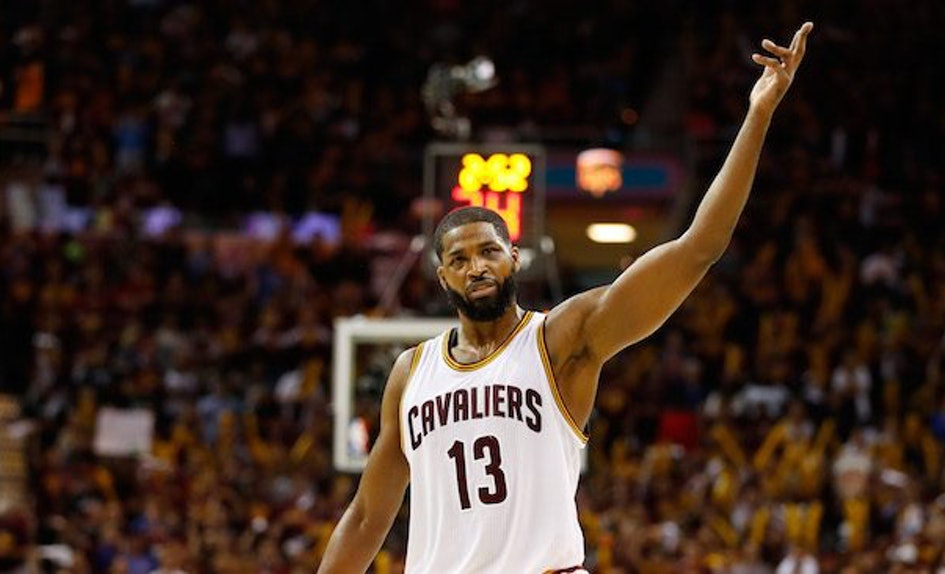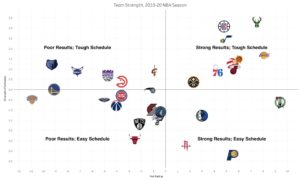
Tristan Thompson And The Value of First Round Picks
2019-11-14At 4-6, the Cleveland Cavaliers are off to a better start than many have predicted. They are a feisty group, playing hard and playing for each other. While they will likely keep their top-ten protected first-round pick (which goes to the New Orleans Pelicans if they do not), the Cavs have looked competent on both ends, as well as quite well-coached. It’s certainly a far better team that the one we saw for the majority of last season. Just take a look at this chart from NBA Math.

The question is, how long will this team stay together? The Cavaliers have five players on relatively large expiring contracts, Tristan Thompson, Jordan Clarkson, Matthew Dellavedova, John Henson, and Brandon Knight. Knight has been out of the rotation, and Henson can’t stay healthy, so there’s little doubt that the Cavaliers will likely move on from both players, either by the trade deadline, or after the season. Dellavedova’s future is a little more murky. He hasn’t been able to put the ball in the basket this season, but his leadership and ability to get the team into their sets has value. He’s also a fan favorite, and it wouldn’t be a shock to see Delly and the Cavaliers come to an agreement on a cheap contract this summer to keep him in the fold.
That leaves Clarkson and Thompson, whom undoubtedly have the most trade value among all the expiring veterans. While Clarkson seems to be a good teammate and has his moments on the court, he is who he is. For every game that Clarkson keeps the team in with his scoring, there are at least as many that he shoots them out of – not to mention his issues on defense. Considering the profiles of young players such as Collin Sexton, Darius Garland, and Kevin Porter Jr., it’s easy to see the Cavaliers moving on from Clarkson, either at the trading deadline or the end of the season.
Then there’s Thompson. The Cavaliers’ longest-tenured player is finally healthy after two injury-riddle seasons, and is playing the best basketball of his career. Thompson is averaging career highs in points, rebounds, assists, blocks, steals, and free throw attempts. More importantly, the Cavaliers have been significantly better with Thompson on the court. In fact, they’ve been quite good.
So the question is, what do the Cavaliers do with Thompson? First off, they need to gauge Thompson’s interest in staying with the Cavaliers after nearly nine seasons with the team. While Thompson is playing well, has been invested in the team, and has never shown any desire to leave Cleveland, it wouldn’t be a huge shock to see him want to go to a team that is closer to a title next summer. If he wants to re-sign with the team, and his asking price is reasonable, then the Cavaliers should strongly consider keeping Thompson in the fold. He’s 28 years old, a leader in the locker room and on the court, and seems to have returned to the form he displayed during the Cavaliers’ first three Finals runs. If anything, he’s playing better than ever. A three-year deal with terms that both parties are comfortable with seems like a no-brainer.
But, what if Thompson is ready to move on? Or if the Cavaliers are ready to move on from Thompson (this seems unlikely, but stranger things have happened)? What both sides are happy with one another, but another team comes calling. What would be the kind of offer that would cause the Cavaliers to part ways with their longest-tenured player?
Many people would take any kind of first-round pick for Thompson and be happy with the deal. To some extent, that makes sense. Until recently, teams have been highly hesitant to trade first-round picks. Players selected in the first round are on four-year deals that are relatively inexpensive, and feature team options for the final two years of the deal. If the player performs well, they are likely getting paid far less that league value over several seasons. If they turn out to be a bust, then the team can waive them after two seasons with no future financial obligations. Yes, teams must pick up the third-year option for a players as they go into their second season, and the fourth-year option before their third season, but there is still relatively little financial risk for the teams.
In addition to the factors listed above, there has been one more thing that has driven up the value of first-round picks over the years; the promise of the unknown. When teams have a first-round pick, there’s always excitement over the kind of player both fans and the organization think they can get. They imagine a future superstar who will take the team to new heights. There’s just one problem with that. Most drafts have one or two future superstars in them, at most. If have draft has more than five of its players make even one All-Star team, that’s highly exceptional. Because of that, once teams have to actually select a real player instead of the imaginary superstar they have been dreaming about, the value of most picks drop immediately after a player is selected. It’s not unlike a new car being purchased. As soon as it’s off the lot, it loses significant value.
Let’s say a team offers a first-round pick for Thompson that ends up being the 21st pick in the NBA Draft. This is likely the best the Cavaliers could hope for (it’s hard to see a team worse than that giving up their first-rounder), but in terms of the type of player it gets you, that’s not saying as much. The last five players to be selected 21st overall are Justin Anderson, DeAndre’ Bembry, Terrance Ferguson, Grayson Allen, and Brandon Clarke. Of these five, Anderson is currently out of the NBA, Allen has struggled significantly so far, Bembry and Ferguson are solid role players, and Clarke is off to an extremely promising start to his rookie year. Based on this sample, as well as Thompson’s career thus far, there’s a greater chance that the Cavaliers would select a player who struggles to find his place in the NBA than there is that they select a player better than Thompson. Even Ferguson (who is a pretty good 3-and-D player) and Bembry (a good defender, if nothing else) aren’t franchise-altering players. Essentially, trading Thompson for a late first round pick would probably be the same as trading him for a worse player, to say nothing of the leadership he provides.
There’s also the matter of the money the Cavaliers would have to take back. While Thompson’s expiring deal will undoubtedly make teams more willing to take on his $18.5 million salary this season, the Cavaliers would still have to take nearly matching salary back in any trade. That means a team would either have to send the Cavaliers a solid player at a different position (which could mean the Cavs getting a first round pick is off the table), multiple players on smaller deals, a weaker player on a large expiring deal (which contenders rarely have), or a weaker player on a long-term deal. In any of these cases, the Cavaliers would have to really think if the return (both in terms of the positive assets and negative salary) is worth giving up Thompson, or if they are making a trade for the sake of making a trade.
It’s hard to say for sure what the future holds for Tristan Thompson and the Cleveland Cavaliers, but it’s looking more and more like keeping Thompson in Cleveland may be the right move for the Wine & Gold.



Good stuff, Mike. It’s a tough call. TT is a great team player, and seems good for the young guys. But it’s hard to imagine what’s going to happen until we know what TT wants for the future.
I’m strongly in the trade Thompson corner. He’s playing the best ball of his career, which means we’re selling high. He’s going to require a large contract as it’s likely his last. The chances of the Cavs timeline of competing for a title lining up with the end of Thompson’s prime is small. He’s never going to be worth more than now and by the time this team is ready to compete in the playoffs he’s likely going to lose much of his use (his reliance on defense and rebounding, as opposed to shooting, ages less well). While first round… Read more »
I lean strongly towards keeping TT.
And Henson on a smaller deal. Ditto Delly.
Knight will get chances to play this year.
Unless JC ups his D & playmaking, no. But I can always hope.
Henson?
We should be trying to trade TT and any of our terrible backup guards. Although I can’t see anyone giving us anything of value for Delly or Knight.
Clarkson, surprisingly, might have the most trade value of our guards. Lots of teams could use his offense off the bench.
Yes, late first often don’t pan out. But it’s better to get something than nothing. And re-signing any of those guys would not be a smart use of cap space.
Depends on the length of contract at least for TT. If it was two years, it wouldn’t be an issue for cap flexibility by the time they were ready to resign Sexton.
Cols has spoken. Everyone adjust your opinion to the opposite viewpoint accordingly.
I think another thing at play is the contract timelines of the Cavs’ core pieces. We’re still paying rookie scale on 4 rotation players for 2-3 more years. You have to pay somebody. I doubt the Cavs are going to be big players in FA so you might as well give TT a big 2 year contract if he stays healthy this year. It’s the same reason I had no problem with the Love contract.
There’s no way TT is settling for a 2 year deal. It’s his last big payday.
Agreed, and I kind of think that he will be looking for more than the Cavs will want to give him. They paid up once because of LeBron and Klutch. Not sure they’ll want to do so again.
He is probably not getting Turner/Randle type money. I just doubt he gets more than 18 from another team.
Toronto will totally give him that.
Why would teams throw money at TT? He may want more than 2 years but I doubt he gets it (not at a high rate anyways). It’s not like every team is going to forget that his contract was considered an albatross the last 3 years.
I’d like them to resign both TT and Delly.
Great piece, Mike. The weird thing now is that 21st picks seem simultaneously overvalued and undervalued. Like you can get a guy like Brandon Clarke at 21 or you can get a scrub. The insane thing is the number of unrafted free agents contributing this year. Kendrick Nunn and Terrence David are killing it. Dean Wade looks sneaky good in Canton. That might be devaluing first rounders even more! The question is if this is a trend or an outlier. IMO, you can get talent outside of the draft but you have to have optionality, an open mind, and the… Read more »
GOOD ARTICLE —-BELIEVE YOU TOUCHED UPON “THE PULSE ” OF ALL US CTB BROTHERS —-ALOT OF QUESTIONS TO BE ENTERTAINED / ANSWERED —–2 YRS AGO WE WOULD HAVE JUMPED AT SOME TEAM OFFERING US A 1ST ROUND PICK FOR T.T. —WOW HOW TIME CHANGES EVEYTHING —-DOES T.T. WANT OUT OR STAY IN CLEVELAND —- FIREND OF MINE -( SEASON TICKET HOLDER ) SAYS T.T. CAN’T WAIT TO GET OUT OF CLEVELAND / DON’T BELIEVE THAT IS BASED ON ANY INFO/ JUST HIS PERSONAL OPINION —ALOT WOULD DEPEND ON WHAT THE CAVS WANT TO RESIGN T.T. FOR AND WHAT T.T.’S AGENT… Read more »
Good article Mike. Was just saying some similar things to my buddy. It’s a weird dichotomy going on with TT right now in which he’s almost increased his value TOO much. So much so that trading him means almost certainly taking back less value rather than a win-win situation that may have occurred had he not come back so prolifically. Interesting things afoot in The Land these days.